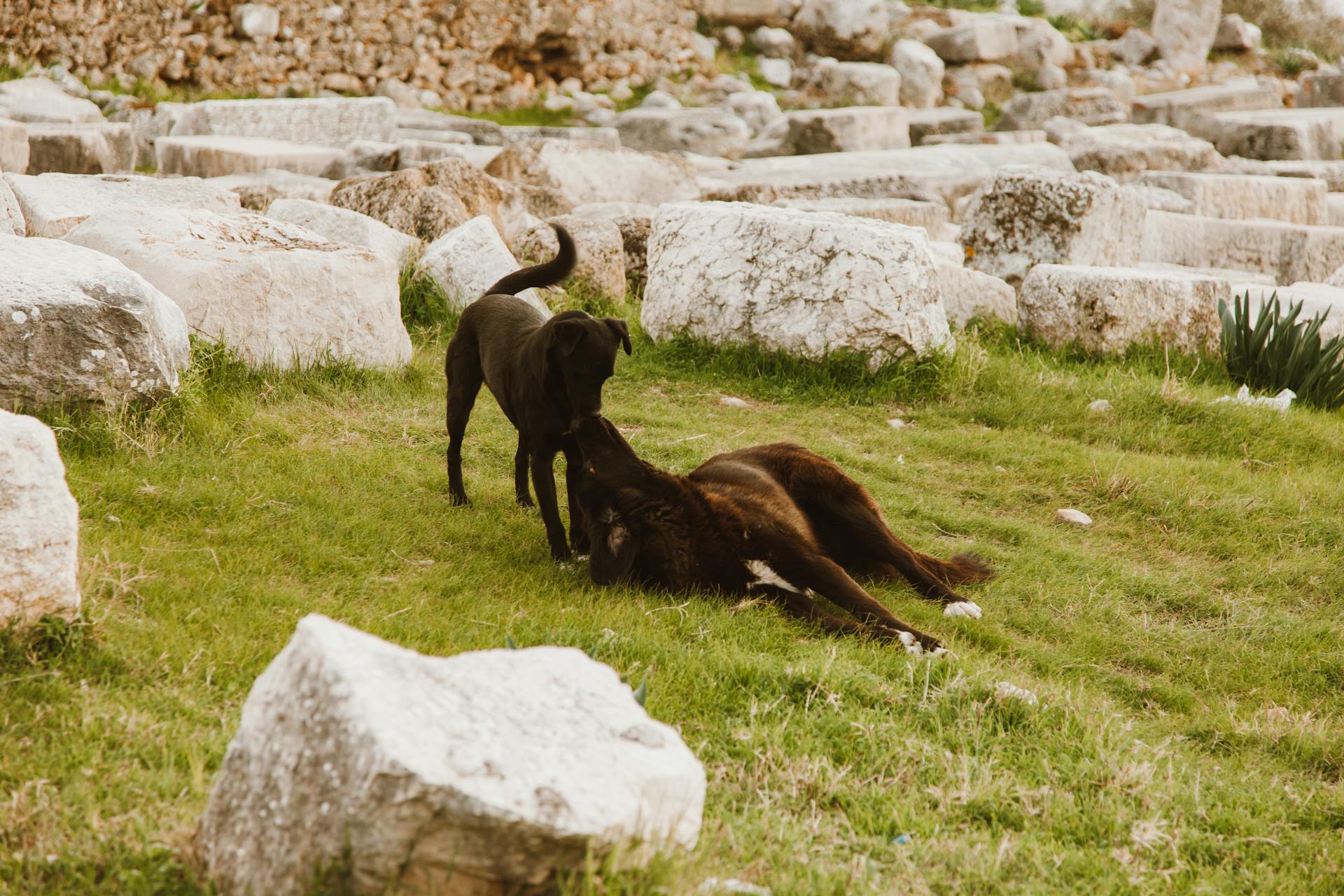
The Black Malshi is a unique and charming breed that requires special care to thrive. They are a cross between a Maltese and a Shih Tzu, and as such, they can be prone to certain health issues.
Their small size means they are prone to hypoglycemia, so it's essential to feed them small, frequent meals throughout the day. This will help regulate their blood sugar levels and prevent any potential health problems.
Black Malshis are also known for their long, flowing coats, which require regular grooming to prevent matting and tangling. They should be brushed daily, paying extra attention to the areas where the fur is longest.
Their friendly and outgoing personalities make them a great companion for many families, but they do require regular socialization to become confident and well-adjusted dogs.
Recommended read: Small Munsterlander Puppies
Caring for a Malshi
Caring for a black Malshi is a big responsibility, but with the right care and attention, they can thrive in a loving home. Malshis are pint-sized pups, weighing around 9-16 pounds, and require daily walks and play to stay happy and healthy.
Their small size means they don't need a lot of living space, but they do need close companionship throughout the day. Leaving them alone for too long can lead to loneliness, boredom, and behavior issues.
To keep their coat looking its best, you'll need to brush them daily and take them to the groomer every couple of months. A shorter hair cut, like the "teddy bear" cut, can make at-home brushing duties easier.
Here are some daily care tasks to consider:
- Brush their coat every day to prevent mats and tangles
- Brush their teeth regularly to keep them healthy and strong
- Provide regular nail trimmings and ear cleanings
- Give them plenty of love and attention to prevent loneliness and boredom
By following these simple care tasks, you can help your black Malshi live a happy and healthy life.
Health Issues
As a Malshi owner, you'll want to be aware of the potential health issues that can arise in your furry friend. The good news is that Malshis are generally healthy dogs with a long lifespan of 12-14 years. However, they can be prone to certain health conditions that you should be aware of.
Some common health issues that can affect Malshis include patellar luxation, dental problems, and eye problems. Patellar luxation occurs when the kneecap moves out of its normal groove, causing pain and discomfort. This condition is more common in smaller breeds like Maltese and Shih Tzu.
Here are some potential eye problems that can affect Malshis: Cataracts: a cloudy lens that can lead to vision lossDry eye syndrome: a condition where the eyes don't produce enough tearsProgressive retinal atrophy: a degenerative condition that can lead to blindness Regular check-ups with your vet can help catch these issues early on and prevent them from becoming major problems.
Patellar Luxation
Patellar Luxation is a common health issue that can affect your Malshi. This condition occurs when the patella (kneecap) moves out of its normal groove on the femur.
Smaller breeds like Maltese and Shih Tzu are more prone to patellar luxation. In fact, both of these breeds commonly deal with this issue.
Mild cases of patellar luxation might not cause any problems, but severe cases can require surgery. Symptoms of patellar luxation include limping, bunny-hopping, and a popping or cracking sound with knee movement.
Regular veterinary check-ups can help identify any potential issues early on, allowing you to get ahead of any developing problems. Your vet can also provide guidance on how to prevent or manage patellar luxation.
Here are some potential signs of patellar luxation to look out for:
- Limping
- Bunny-hopping
- Popping or cracking sound with knee movement
Health
The Malshi is generally a healthy breed with a lifespan of 12-14 years, but like all dogs, they can be prone to certain health issues. These include patellar luxation, a slipped kneecap, which is common in both Maltese and Shih Tzu breeds.
Patellar luxation can be painful for your Malshi and may require surgery to correct. It's essential to keep an eye out for signs of this condition, such as skipping or hopping when running.
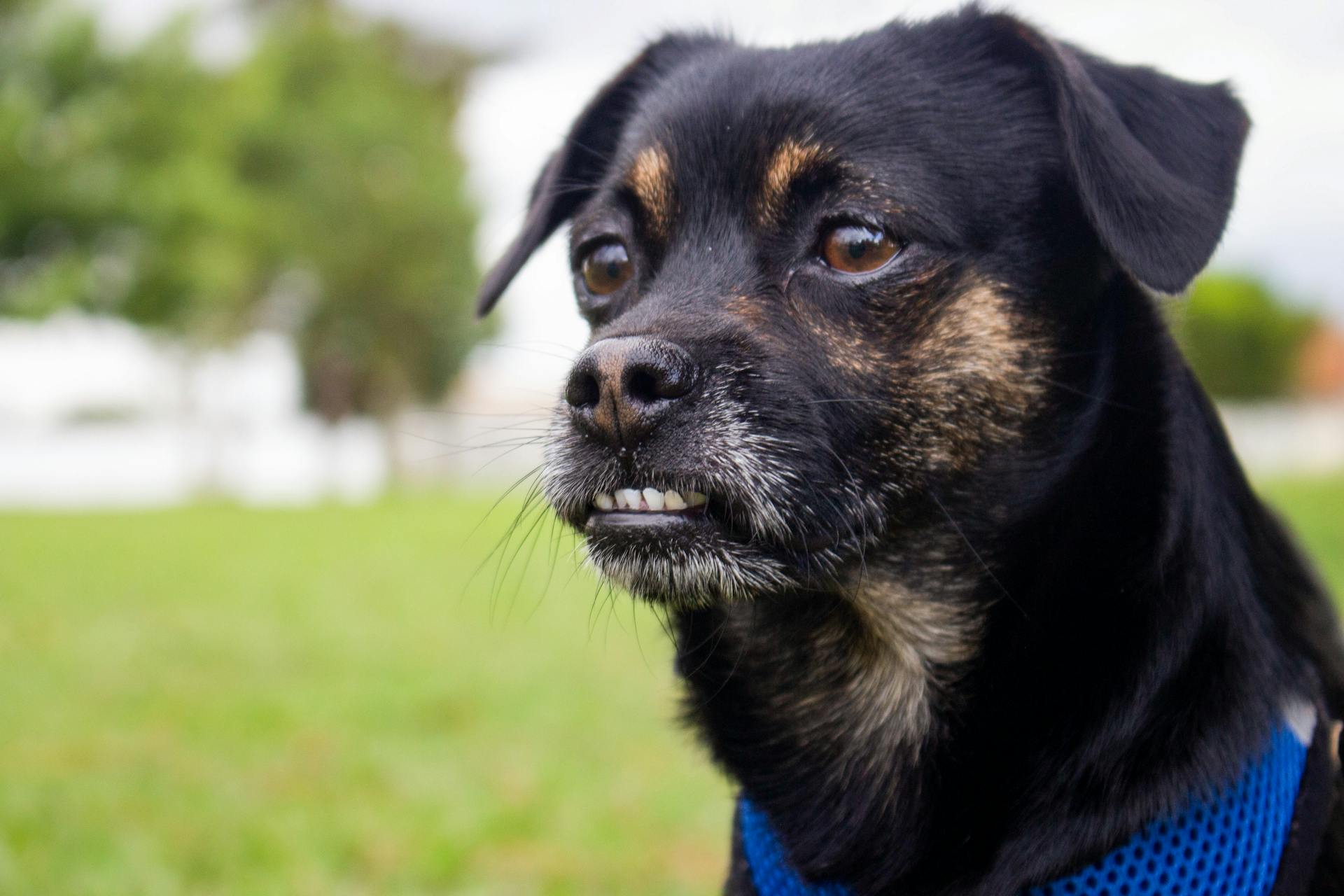
Dental problems are also common in small breeds like the Malshi. Daily brushing and regular check-ups with your vet can help prevent dental issues.
Eye problems are another concern for Malshis, particularly cataracts, dry eye syndrome, and progressive retinal atrophy. These conditions can be inherited from their Shih Tzu parent and can lead to vision loss if left untreated.
Here are some common eye problems that may affect your Malshi:
- Cataracts: causes the eye's lens to become cloudy, leading to vision loss
- Dry eye syndrome: occurs when a dog doesn't produce enough tears, causing red and inflamed eyes
- Progressive retinal atrophy: a degenerative eye disorder that can lead to blindness
Regular eye checks and keeping the hair around their eyes trimmed can help prevent eye irritation and detect any potential problems early on.
Grooming and Care
Grooming a black Malshi requires daily attention to prevent matting and tangling. Brush their hair daily to keep it looking its best.
Regular grooming sessions with a professional are also necessary, ideally every 4 to 6 weeks for a good trim. You can get creative with the sort of hairdo you pick out for your Malshi.
In addition to grooming, nail trims, ear cleanings, and eye cleanings are essential to keep your Malshi healthy. Dental care is also vital, so brush their teeth regularly, starting from puppyhood.
Here's a quick rundown of your Malshi's grooming needs:
Grooming and Care
Malshis have a beautiful, fluffy coat that requires regular grooming to prevent matting and tangling. You'll want to brush your Malshi at least 2-3 times a week, more often if they're prone to shedding.
Their eyes are also prone to tear staining, so make sure to clean them regularly with a damp cloth. Regular eye cleaning will prevent unsightly stains and keep your Malshi's eyes healthy.
Malshis are intelligent and active dogs that require regular exercise to stay happy and healthy. Aim for at least 30 minutes of exercise per day, whether it's a walk, run, or playtime in the yard.
Working with your veterinarian to develop a feeding plan is crucial for your Malshi's health. This plan should be tailored to their age, weight, and health needs, and should include a complete and balanced diet of dog food approved by AAFCO.
As your Malshi ages, their dental health becomes increasingly important. Regular brushing and dental chews can help prevent periodontal disease, a common health issue in Malshis.
Coat Care
Your Malshi's coat requires daily brushing to prevent mats and tangles. Brushing their hair daily will help prevent tangling and matting.
Expect to visit a professional groomer roughly once every 4 to 6 weeks for a good trim. You can get creative with the sort of hairdo you pick out for your Malshi.
Daily brushing also helps prevent hair from getting into the corners of their eyes, where it can cause drainage issues. Clean the corners of their eyes regularly to prevent this.
Malshis have coats that require daily brushing, just like their Shih Tzu and Maltese parents. While they don't tend to wear long draped coats like their parents, you'll still want to plan on brushing them every day.
Here's a quick rundown of what you can expect:
- Daily brushing to prevent mats and tangles
- Regular nail trims
- Ear cleanings
- Brushing their teeth regularly to prevent dental issues
Eye Care
Eye Care is a crucial aspect of Malshi grooming and care. Regularly checking your Malshi's eyes can help identify potential issues early on.
The Malshi's Shih Tzu heritage makes them prone to eye problems, so it's essential to keep an eye out for signs of trouble. Keep the hair around their eyes trimmed to avoid irritation, which can exacerbate existing issues.
Cataracts are a common eye condition that can cause vision loss in Malshis. If you notice cloudiness or signs of vision loss, such as clumsiness, notify your veterinarian right away.
Here are some eye conditions to watch out for in your Malshi:
- Cataracts: Cloudy lens leading to vision loss
- Dry eye syndrome: Red, inflamed eyes, pain, increased blinking, and discharge
- Progressive retinal atrophy: Reluctance to enter dark spaces, clumsiness, and cataracts
Don't wait until it's too late – schedule regular check-ups with your veterinarian to catch any eye problems early on.
Appearance
Malshis are tiny dogs, weighing between 6-12 pounds and standing just 10 inches tall. They come in a variety of coat colors, including white, brown, gold, black, and even blue.
Their coat is silky and doesn't shed much, making them ideal for people with allergies. Malshis can inherit the long-haired plume of a tail characteristic of Maltese dogs.
Their underbite, like the one common in shih tzus, can also be a distinguishing feature of Malshis. Some Malshis may have a button nose, while others inherit the shih tzu's royal heritage.
Related reading: Shiba Inu Coat
Training and Behavior
Black Malshis adore their families and typically desire to be close to them as much as possible. Long periods of time spent alone can lead to boredom, anxiety, and related behavior issues like barking, chewing, and house soiling.
Malshis are smart and eager to please, but they’re known for having a bit of a willful streak. Consistent positive training that uses rewards instead of punishment is essential for building a strong human-animal bond.
Positive reinforcement training is crucial for Malshis, as it exercises their brain and body, and helps them learn how to interact with humans and other animals. This training should start as soon as your new family member comes home.
Malshis are highly trainable and eager-to-please dogs, making them a great breed for both first-time and experienced dog owners. They thrive on attention and can get along well with other pets and kids.
However, Malshis may not be the best fit for families with young children, as toddlers could accidentally hurt the teeny-tiny dog. Parents should teach their children proper "pet-iquette" and how to handle animals with care.
Explore further: Rhodesian Ridgeback Training
Malshis have moderate energy levels and need short walks and opportunities to play each day. They are classically Velcro dogs, meaning they’ll stick by your side on the couch and even on a trip to the bathroom, too.
Malshis are brilliant, although they can have a bit of a hard time learning how to use the potty outside. They can learn the cutest tricks like how to sit pretty or play dead with repetition.
General Information
The Black Malshi is a small dog with a big personality. They typically weigh between 6 to 12 pounds.
Their height can range from null to 10 inches, making them a great fit for apartment living. This is because they have low exercise needs and are generally active, but not high-energy dogs.
Here are some key characteristics of the Black Malshi:
Their lifespan is 12 to 14 years, which means you'll have plenty of time to enjoy their companionship.
Overview
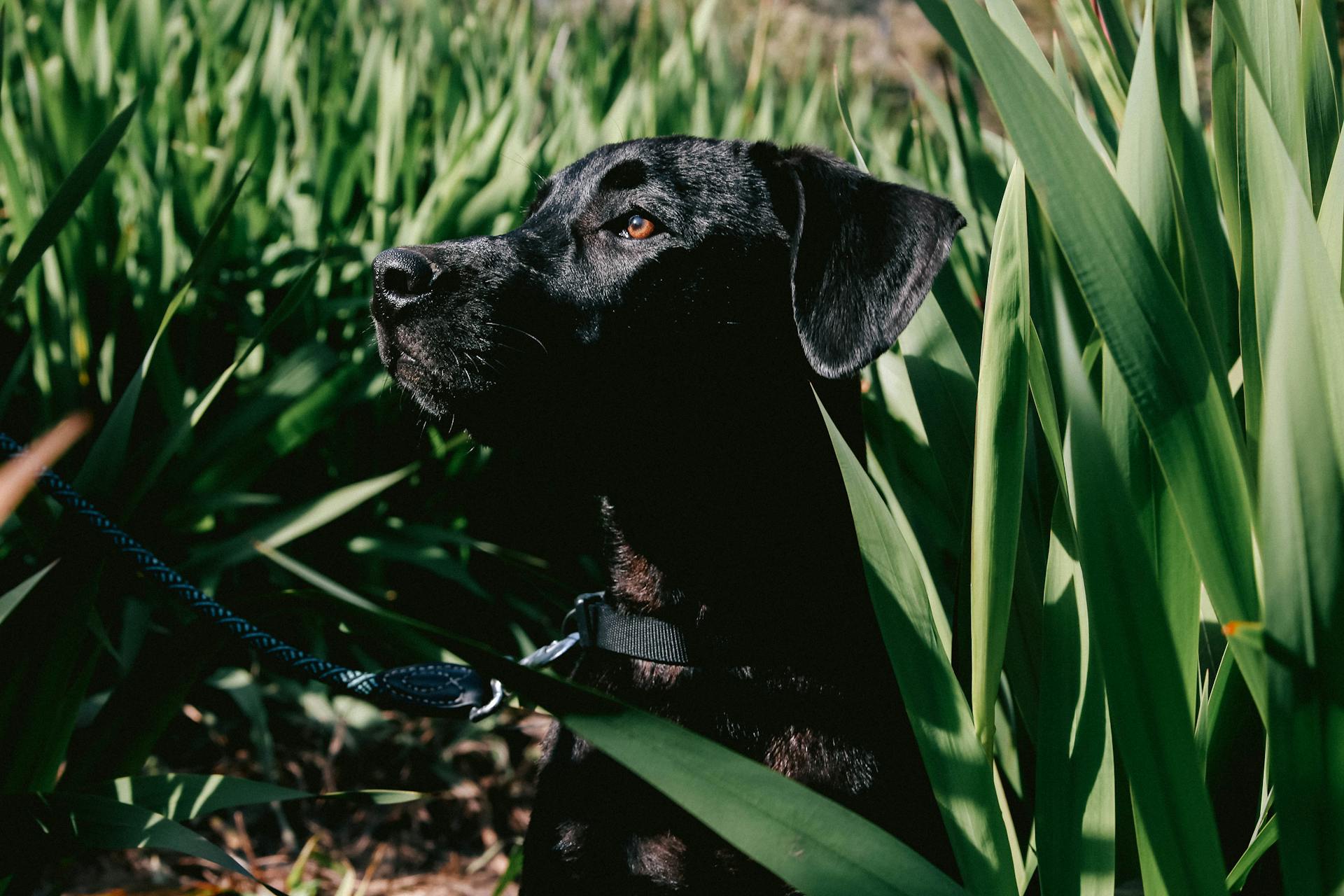
The Malshi is a small, friendly dog breed that's perfect for many families. They typically weigh between 6 to 12 pounds and stand 10 inches tall.
Their lifespan is around 12 to 14 years, making them a long-term companion. Malshis are known for their outgoing and playful personalities, and they're often described as cute and adorable.
They're a great choice for families with children, as they're gentle and patient. However, they do require regular grooming due to their long coat.
Malshis are also a good fit for seniors and people with single lifestyles, as they're happy to spend time with their owners. They're adaptable to apartment living and don't require a lot of exercise, but they do need daily mental and physical stimulation.
Here are some key characteristics of the Malshi breed:
Malshis are known for their strong loyalty and affection towards their owners, but they can suffer from separation anxiety if left alone for too long. They're best suited for households where they'll receive plenty of attention and companionship.
History
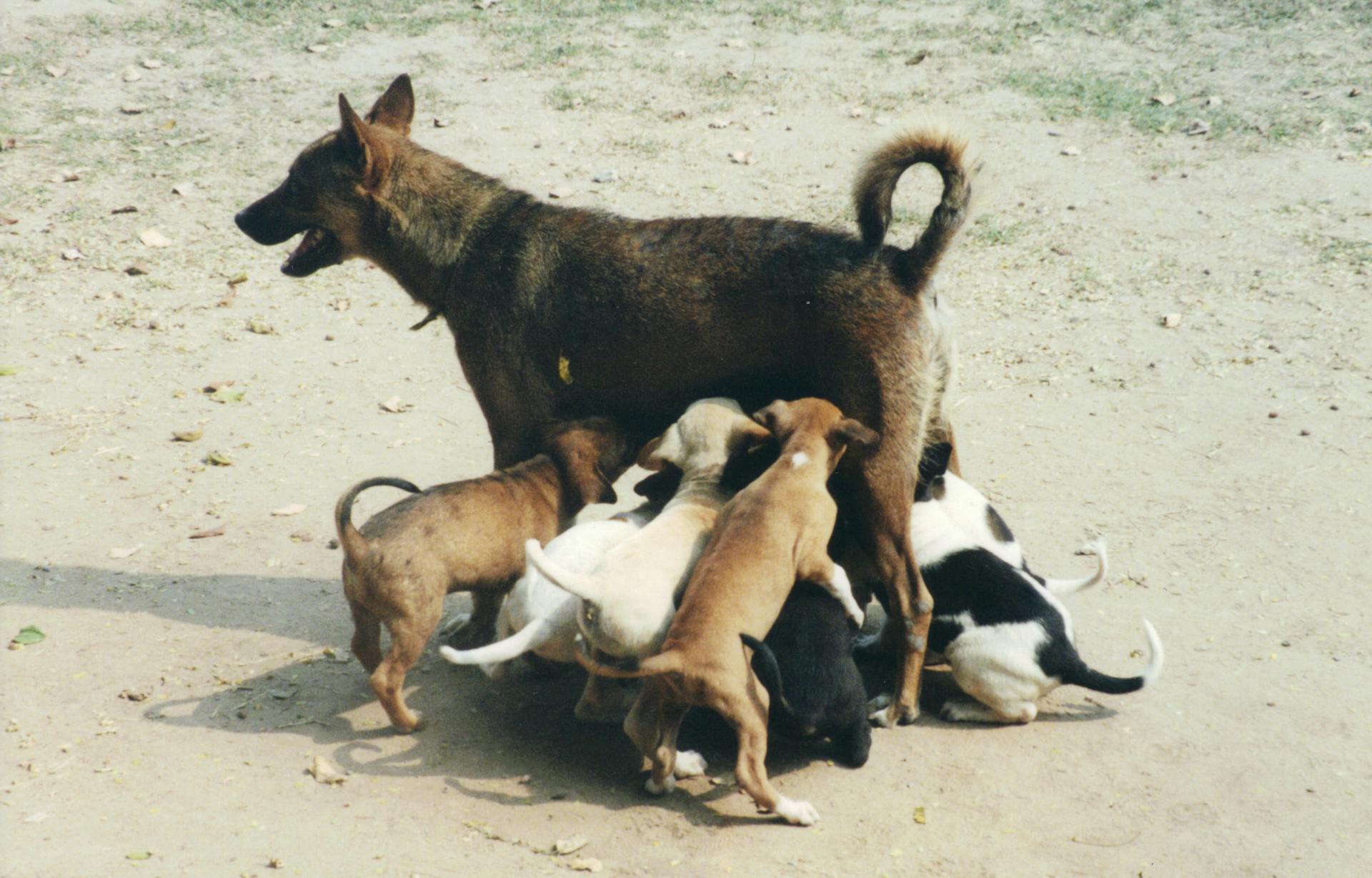
The Malshi is a relatively new hybrid breed that originated sometime around the 1990s and has been gaining popularity in recent decades.
The Maltese, one of the Malshi's parent breeds, may have originated as far back as 2,800 years ago in Malta, an archipelago below Sicily.
Aristocrats of the Roman Empire fancied this Mediterranean dog, which became a status symbol for the wealthy and famous.
The shih tzu breed, the other parent of the Malshi, has been around for at least 1,000 years and was bred as a companion dog, living in Tibetan monasteries.
According to folklore, shih tzus were dutiful temple dogs and trained to turn the prayer wheels.
The Maltese was even referred to as "perfect in its small size" by Aristotle.
Consider reading: Black Boxer Breed
3 Little-Known Facts
Here are three little-known facts that might surprise you:
The world's largest living organism is a fungus that covers over 2,200 acres in Oregon, USA. It's estimated to be around 2,400 years old.
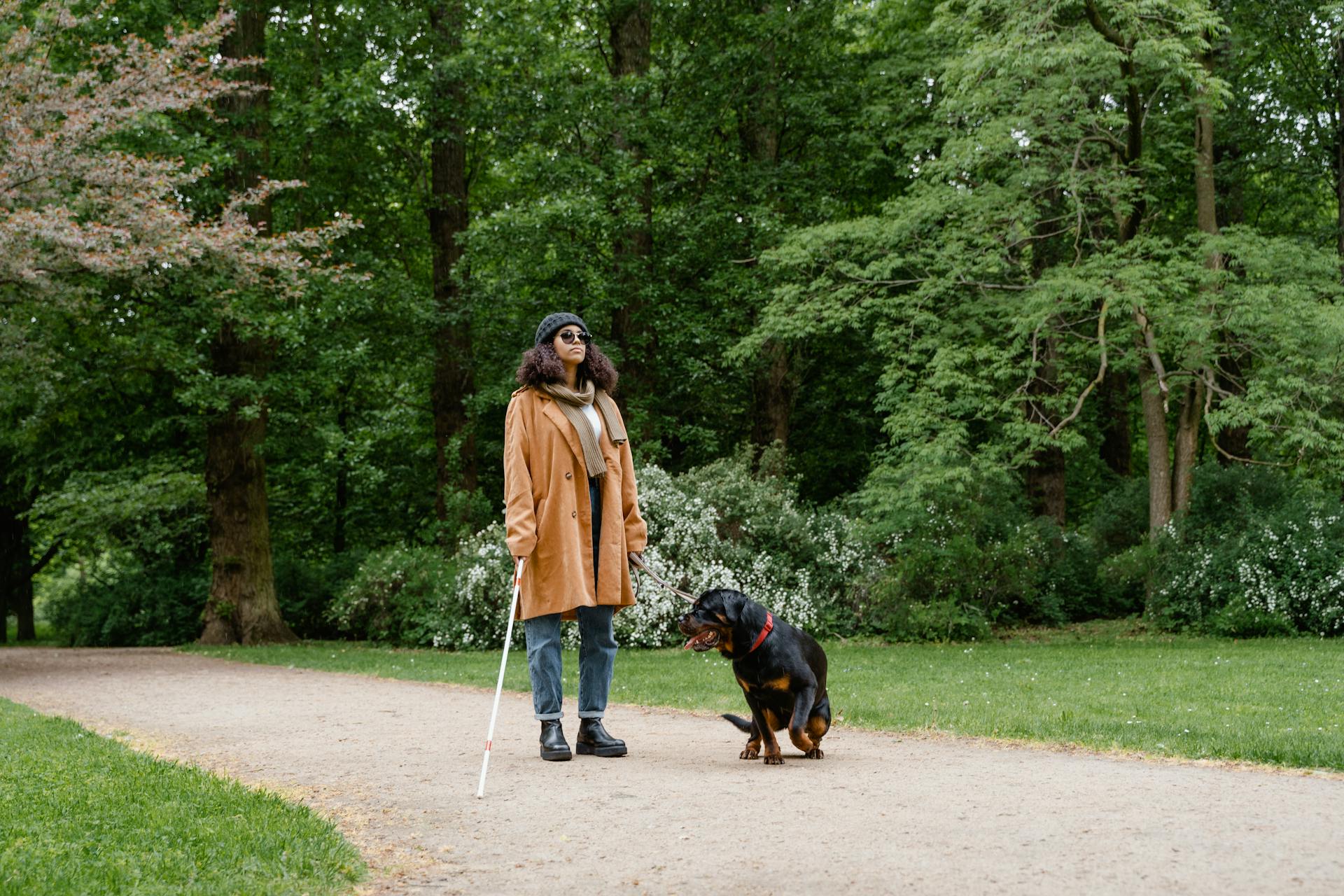
Did you know that the shortest war in history was between Britain and Zanzibar on August 27, 1896, and lasted only 38 minutes? Zanzibar surrendered after just 12 minutes of fighting, and the remaining 26 minutes were spent on ceasefire negotiations.
The longest recorded flight of a chicken is 13 seconds. Yes, you read that right - 13 whole seconds!
Health and Conditions
The black Malshi is a wonderful companion, but like all dogs, it's prone to some health issues. A typical black Malshi can live between 12-14 years.
Both Maltese and Shih Tzu, the parent breeds of the Malshi, are healthy dogs with long lifespans. However, they can inherit common health problems from their parents. The Institute of Canine Biology says mixed-breed dogs like the Malshi are less likely to have genetic disorders.
Patellar luxation, or a slipped kneecap, is a common issue in both Maltese and Shih Tzu, and your black Malshi may be prone to it too. Regular check-ups with a trusted vet can help catch any developing issues early on.
Recommended read: Are Maltese Dogs Smart
Dental problems are also common in small breeds like the Malshi. Daily brushing and regular check-ups with a vet can help keep your dog's teeth healthy and clean.
Some other potential health issues to watch out for in your black Malshi include eye problems, such as cataracts and progressive retinal atrophy, and reverse sneezing.
Frequently Asked Questions
How rare are black Maltese?
Black Maltese puppies are extremely rare, making up a small percentage of births. Their coat color often changes as they grow, typically resulting in a white or light cream coat.
How big will a Malshi get?
A full-grown Malshi typically weighs 6-12 pounds and stands 10 inches tall. This unique size combination makes the Malshi a distinct breed.
Featured Images: pexels.com


